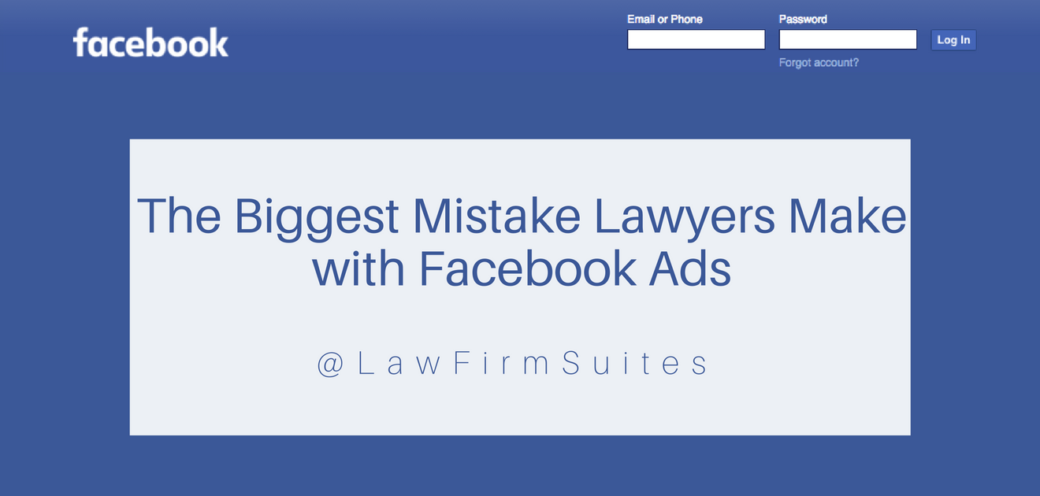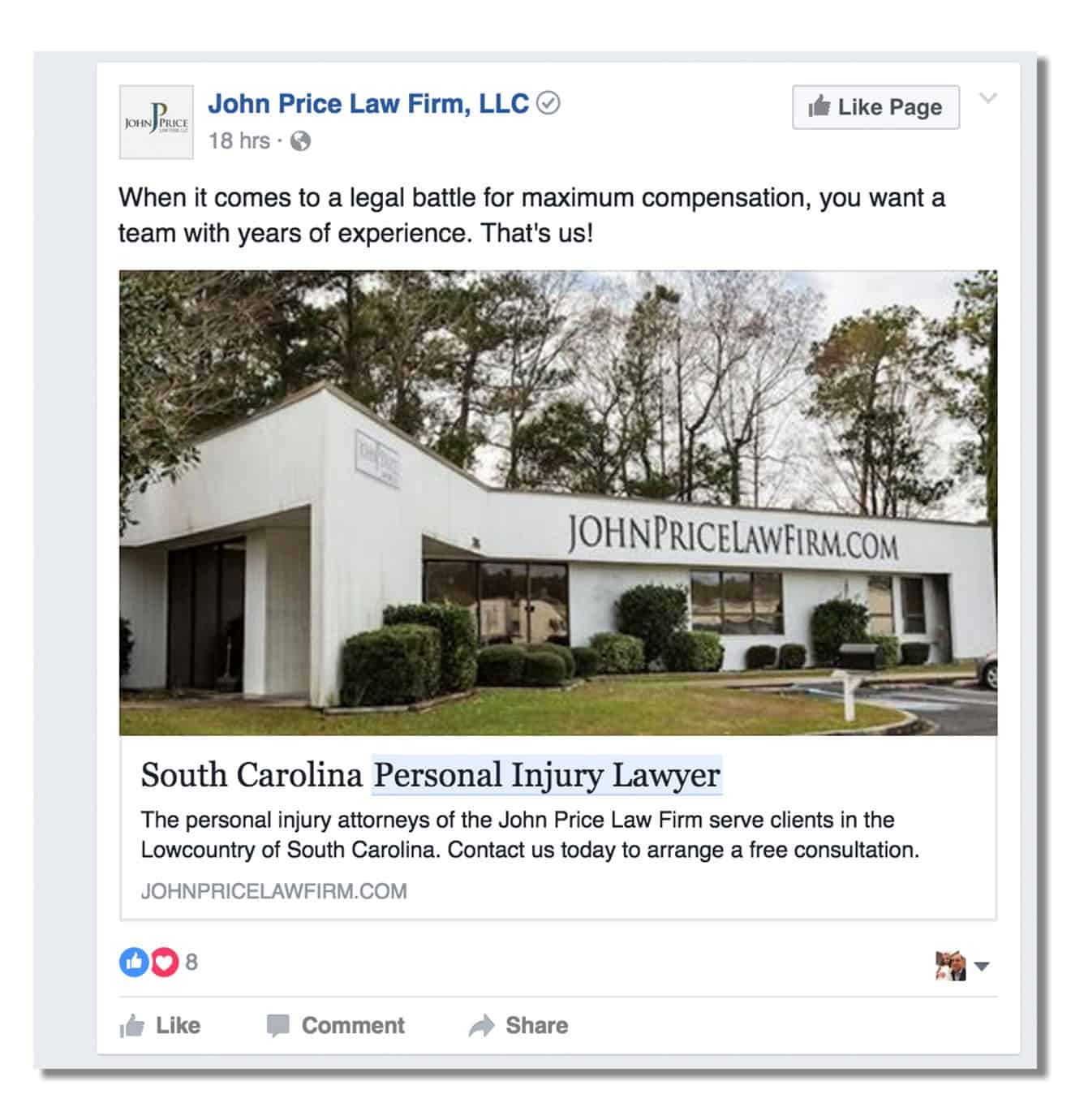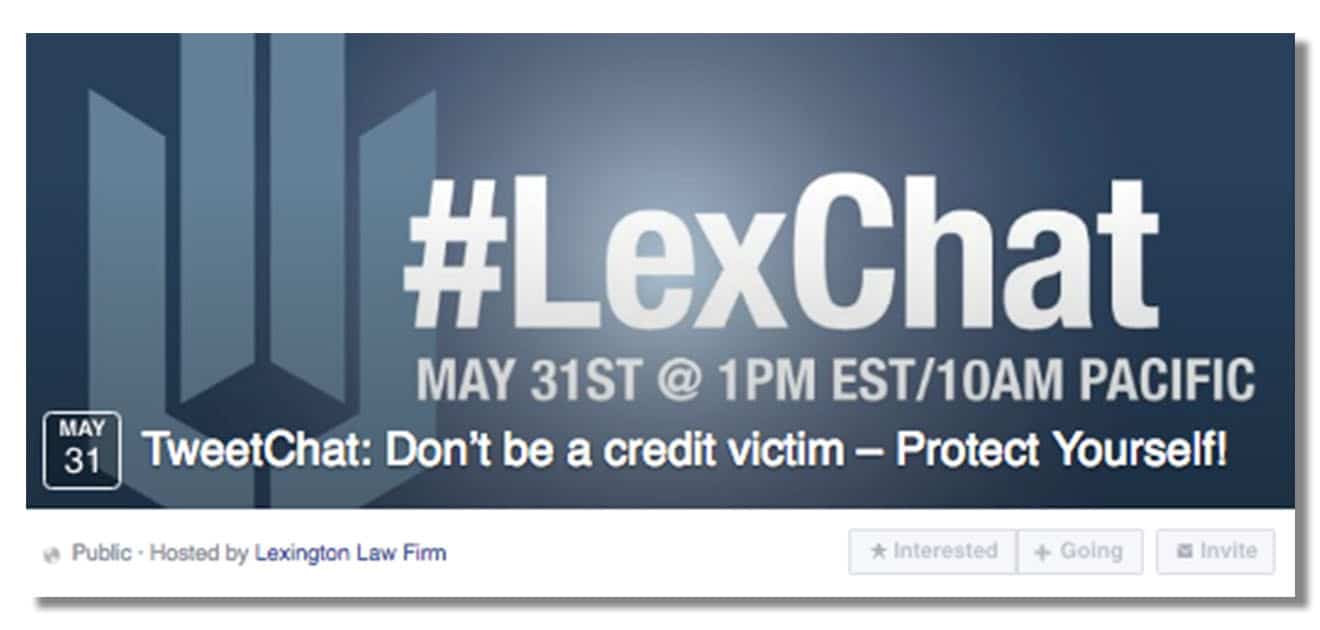By advertising legal services on Facebook, lawyers only reach 9% of prospective clients. Increase ROI by advertising a lead magnet instead.
In an article on NOLO’s Legal Marketing Blawg, solo practice expert Carolyn Elefant echoed what many clients feel about ads on Facebook by lawyers: she’s sick of seeing them.
Lawyers are not typically naturals at marketing. Often, they tend to throw money at lead generation rather than thinking through the most efficient strategies.
But posting ads up on social media without a plan can feel like you’re throwing money down bottomless pit.
Lawyers aren’t entirely wrong about wanting to capture some of Facebook’s audience. The social media giant had 1.65 billion active monthly users in the first quarter of 2016, and accounts for nearly one-fifth of all Internet traffic in the United States.
A Context Problem: Search vs. Demographics
When advertising on Facebook, lawyers often have a context problem.
Many firms approach Facebook advertising the same way they approach Google Adwords. But there’s a big difference between the two platforms.
With Google adwords you try to connect with prospective clients as they search for information about specific legal problems (or lawyers). Ad delivery is a function of keywords searched rather than demographic profiles.
By contrast, Facebook ad delivery is based on demographic characteristics and interests (age, gender, education, location, occupation or hobbies). For example, a business lawyer that focuses on technology start-ups may target Millennial males who reside in Brooklyn, and are interested in hack-a-thons, craft beer and designer hoodies.
Not Every Client is Buying Today
Even though a social media user may meet your target profile and see your ad, it doesn’t mean they are looking to purchase legal services today.
According to sales and marketing expert Chet Holmes, only 3% of people meeting your firm’s ideal client profile are looking to hire a lawyer right now, and only another 6% of your target market is thinking about retaining a lawyer.
This means, if your ads are of the “hire our firm, we are great” variety, they will only appeal to 9% of total viewers in your target market.
I don’t know about you, but if I’m plunking my “hard-earned” down on an ad campaigns, I want better reach than 9%.
What’s the solution: The Lead Magnet
In his book the Ultimate Sales Machine, Holmes recommends that you find a topic (preferably framed as a problem) that would appeal to any potential purchaser, and where your legal service is one small part of the overall solution.
You then create a whitepaper, ebook, webinar or podcast around that topic. Target clients then have to trade their email address to access the information.
The creation process isn’t difficult, but coming up with a topic that your target clients will really want to get access to is tricky.
The bottom line is most legal topics are boring. You have to create something that appeals to what your client wants or fears most, where your legal services are part of the solution.
As Exciting as a Visit to the Dentist
For example, in my own law practice I represent entrepreneurs and business owners. The services I provide are preventative in nature (contract drafting). Corporate legal services are a lot like going to the dentist for regular cleanings. It helps you avoid a potential root canal, you have to do it, but no one really wants to.
But entrepreneurs constantly think about getting funding to start and grow their businesses.
So I made an audio course about the best ways business owners can raise investment capital without hiring an investment banker. Of course, one part of the solution is making sure all your legal ducks are in a row so you don’t give investors a reason to walk away from a deal.
Guess what? My law firm just so happens to help business owners with that.
To get the valuable information in the course you have to give me your email address. In turn, I get to market to you by email forever (or at least until you opt out of my list).
The audio course appeals to everyone in my target market.
The 9% of prospective clients who are ready to buy legal services call right away. The other 91% get regular emails from me (with more useful information) so I remain top of mind should the need come up.
Divorce Lawyer Advertises Child Support Workshop
New York matrimonial lawyer, Joleena Louis, developed a Child Support Workshop that she promotes through Facebook ads. It’s a brilliant idea. Joleena knows that divorced parents frequently need help from lawyers with child support problems.
Joleena targeted people in the New York City area between the ages of 25 and 45 with an interest in child custody, child support, divorce and father’s rights. She pays about $0.20 per click.
Her workshop appeals to 100% of her target audience, whether or not they have a problem right now that requires the help of a lawyer.
#awesome: A Twitter Chat for Credit Repair (Advertised on Facebook)
Salt Lake City consumer advocacy law firm Lexington Law Firm, used Facebook to promote a Twitter Chat about how you can protect yourself from exploitative creditors and collection agencies. The credit experts at the firm chatted directly with prospective clients about specific issues they faced.
It’s was a smart idea because it set the firm up to engage with participants after the Twitter Chat, and clients described to the firm their biggest problems. Lexington Law Firm can then use that research to develop other lead magnets, social posts and blog articles that best serve the needs of their target market.
Part-Time Law Practice Webinar
In her NOLO article, Carolyn Elefant discusses how she used Facebook ads to promote a webinar about part-time solo law practice. Elefant also publishes the very popular (and one of the longest running) legal blog, MyShingle.
Elefant explained that she made a small ($25) spend on Facebook ads and wasn’t thrilled with her ad copy. Even though she wasn’t satisfied with her results, Elefant’s logic was sound. To get the most value out of your advertising dollars, use Facebook as a platform to promote something of educational value, not the purchase and sale of legal services.
The content will drive potential one step closer to retaining your firm, and will give you the opportunity to stay top of mind with prospects for when they need to hire a lawyer down the road.






